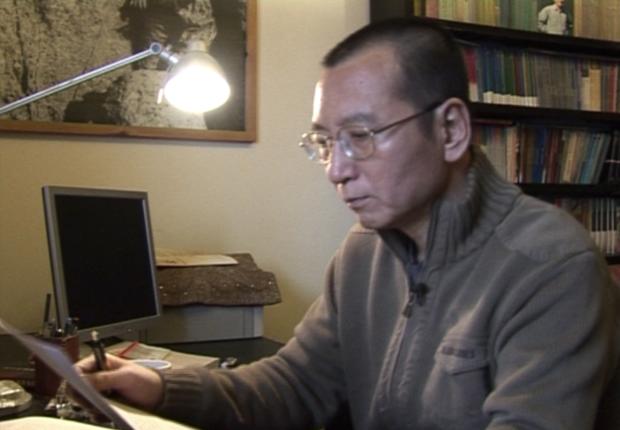
In this image taken from a Jan 6, 2008, video footage by AP Video, Liu Xiaobo looks at documents in his home in Beijing, China. According to a statement Friday, July 7, 2017, on the website of the First Hospital of China Medical University, the Chinese medical team charged with treating imprisoned Nobel Peace laureate Liu Xiaobo has stopped using cancer-fighting drugs so as not to overwhelm his severely weakened liver, raising concerns that China’s most prominent political prisoner is critically ill. (Photo from an AP Video via AP)
First published: 4:29 p.m., July 9, 2017
BEIJING — Two foreign specialists who visited Liu Xiaobo said Sunday that the cancer-stricken Nobel Peace Prize laureate would be able to safely travel abroad for treatment, apparently contradicting statements by Chinese experts who say a medical evacuation would be unsafe.
The doctors – an American and a German – who saw Liu on Saturday issued a joint statement saying that their home institutions – the University of Heidelberg and the MD Anderson Cancer Center in Texas – have agreed to accept Liu, but that any evacuation would have to take place “as quickly as possible.”
Liu, China’s most prominent political dissident, was diagnosed in May with late-stage liver cancer while serving an 11-year sentence for inciting subversion by advocating sweeping political reforms that would end China’s one-party rule.
The differing opinions about the feasibility of Liu traveling could further complicate the tug-of-war over the 61-year-old activist. For weeks, family and supporters have asked for Liu to be fully released and allowed to receive treatment abroad, arguing that authorities are keeping him in China only out of political considerations.
Meanwhile, the Chinese government has maintained that Liu is receiving the best treatment possible at the First Hospital of China Medical University in the northern city of Shenyang. Chinese state media have labeled Liu a convicted criminal, and the government has warned other countries to stay out of China’s internal affairs.
Following international criticism, China allowed the two foreign experts, Dr. Markus W. Buchler of Heidelberg University and Dr. Joseph Herman of the MD Anderson Cancer Center at the University of Texas, to visit Liu.
Buchler and Herman said in their statement Sunday that they “acknowledged” the quality of care Liu has received in Shenyang. But they said that Liu expressed a desire to leave China, and that they judged that he “can be safely transported with appropriate medical evacuation care and support.”
Already accused of letting an imprisoned Nobel laureate fall terminally ill on its watch, China’s government faces a public relations disaster whether Liu stays in the country or goes abroad. By deeming Liu physically able to travel, the two foreign experts effectively eliminated a key reason the government has put forward to justify why Liu cannot leave, said Hu Jia, a Chinese dissident.
“There are no technical obstacles to his leaving, if only the Communist Party is willing to open the cage,” Hu said, adding that Beijing is afraid of letting its most potent opposition symbol go abroad as long as he is able to speak to the media.
“As long as he can still talk, the global media will report and transmit his message to the world,” he said. “Every sound he utters will be recorded as a force for changing China.”
Shang Baojun, a former lawyer for Liu who remains close to the family, told The Associated Press on Saturday that Liu was coherent enough during the visit with the foreign doctors to say that he wanted to go abroad for treatment, preferably to Germany, although the U.S. would also be fine. At times, Liu was lucid enough to communicate in English, Shang said.
The hospital itself released a brief online statement late Saturday that quoted an unnamed Chinese expert as saying that it would be unsafe for Liu to travel abroad. The hospital has previously said that Liu’s liver function is deteriorating, and that blood clots are forming in his left leg and could potentially travel to the brain or the lungs, leading to death.
Phone calls to the hospital’s administration department and publicity office rang unanswered Sunday.
The US urged China to allow Liu to travel.
“We continue to call on the Chinese authorities to grant Mr. Liu full parole and to release his wife, Liu Xia, from house arrest, and to allow them to travel to seek specialized care that would ease his suffering in his final days,” said Mary Beth Polley, the spokeswoman for the US Embassy in Beijing.
Hu agreed that Liu was almost certain to die soon regardless of where he was.
“Letting him fly away from his hell would be a massive psychological boost, stronger than any medicine you can give him,” Hu said. “It will improve his final days, so he will die with dignity — and in the free world.”